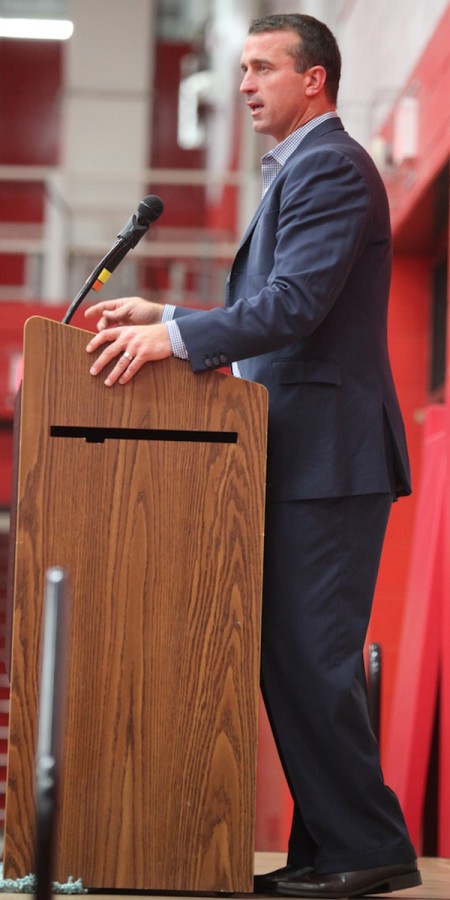Silence speaks louder than words
October 12, 2015
Silence. From 3000 students.
Even now, almost a week later, I’m still amazed by the way former NBA player and recovering drug addict Chris Herren could captivate an audience of high school students so completely.
He wasn’t telling a vivid story. He wasn’t talking about his worst day. He wasn’t talking about his best. In fact, he barely spoke about himself.
No, his message was more of self-empowerment and respect, of being comfortable enough to “be yourself on a Friday night,” a message I whole-heartedly supported. Something about what he said made everything click in my head—I never really understood why people could fall so easily into a malicious cycle of alcohol abuse, but when he talked about the self-esteem that it requires
said made everything click in my head—I never really understood why people could fall so easily into a malicious cycle of alcohol abuse, but when he talked about the self-esteem that it requires
to be sober, the underlying issues made sense.
Needless to say, I was enraptured. That was why, when I heard other students talking about his speech with scorn, mocking Herren’s talking points with their own versions of what he said and quotes from the talk taken out of context just for a cheap laugh, I’ll admit, I got angry.
I might be biased, of course. After being able to talk to him personally, and seeing how genuine he was, I’ll admit that I was more inclined to be lenient on my critique of his speech. Even more importantly, I can understand why people didn’t connect to his statements during the assembly—it was certainly different from what students are used to hearing from speakers.
A simple comparison to the speaker from two years ago, Nick Gore, is enough to show the stark difference. That speaker spoke solely of his experience as an addict, and while that speech was powerful in its own way, I found it more impactful when Herren didn’t focus entirely on himself, but rather related it back to students.
Perhaps I didn’t understand before because of who I am. Perhaps it’s because I’m not an athlete. I don’t understand that overwhelming push from others to be the star player of a team. Perhaps it’s because I’m not really the “party” type—any parties I attend are few and far between. Perhaps that’s why I found something much more universal in what Herren was saying.
The message of self-empowerment doesn’t apply solely to drug-users or drinkers. It can extend to anyone.
Herren said that he could immediately tell who his speech applied to when he asked the question, “What about yourself wasn’t good enough that you didn’t have to drink on a Friday night?” Those who didn’t want to answer ducked their heads. There’s something powerful in that image.
I’ll admit that while I kept my composure during the assembly, I broke down a little during his speech at night—not so much that I had to leave, but enough that I had to blink back tears and clear my vision a few times. And there is something powerful in that as well.
Despite my reaction to the evening’s speech, I still think that the assembly was the more important of the two to attend. So many people I know are always extraordinarily self-deprecating, and it shocks me. Sure, every once in awhile some adult will mention that we as students and as people in general should value ourselves, but it will never be as strongly emphasized as it was in that speech.
It may seem like a roundabout way for me to say it, but what I’m trying to iterate is that the message that Herren gave isn’t about the dangers of heroin. It never was just “another drug talk.” It was about self-respect, and that, I think, is more valuable than any number of lessons on how to “just say no.”







